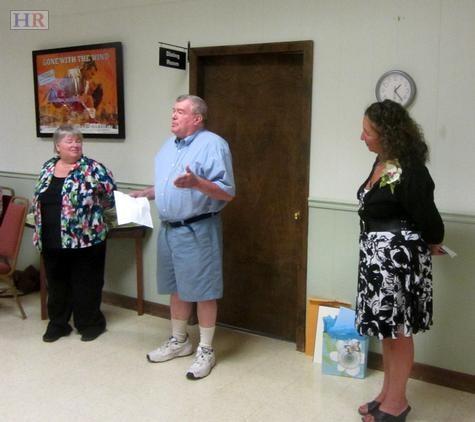Civics Sunday: Interview with Library Trustees Chair Bob Malone

Mr. Malone, a resident of Holliston for the past 29 years, was elected to the Library Board of Trustees in 2017 and serves as its Chair. Additionally, he is Chair and former treasurer of the Council on Aging, and holds a 3-year State appointment to the Holliston Housing Authority. He is also a consultant for the Episcopal diocese of Boston.
The interview follows:
Questions
1. How does the Library Board of Trustees develop its agenda for each meeting?
The director of the Holliston Library, Leslie McDonnell, develops the monthly agenda. “We are blessed to have her,” Malone said.
2. How does the Library Board of Trustees make informed decisions that are the best for our community? Please tell us of one recent decision made by the Library Board of Trustees as an example.
Malone began, “Our primary responsibility is to think ahead as best as we collectively can.” The Trustees rely on library professionals to bring their wisdom to bear as they consider issues related to the delivery of efficient and effective library services.
A 5-year long-range plan is helpful, especially when thinking about changing modes of delivery of services. Not only is a 5-year plan helpful, it is a requirement to the MA Library Board of Commissioners. On-going State and construction grants require a current long-range plan.
In selecting an example of a recent decision made by the Trustees, Malone spoke about their inquiry of the Board of Selectmen to hire a professional consultant to plan for the future of the Library. Erroneously, some in town thought the request was made because at the time, the library was undergoing roof repair construction. “The request for funding for a library planner happened at the same time [as the construction], but not because of it,” Malone explained.
“We are at the end of a 5-year plan, and we need some professional help for how best to position ourselves for library services. There have been changes in services: music tapes, a research area with books, encyclopedias…there is no space or resources to keep outdated methods,” Malone explained.
“We do a great job with the children’s section. We get more requests about what to do for preschool and school age kids.” Malone continued, “We do things that enhance [the school experience]. The police chief read a story to children, we have a program to reduce stress for children, children’s reading groups, in an educational environment.”
“There are libraries around us that are doing this [hiring a professional consultant].” Malone explained challenges that might occur if the library were to be reconfigured: room would have to be created for community areas; we’d need to re-imagine the present magazine room or the computer area. Patrons no longer come in to read magazines, newspapers, or borrow music tapes. “The things we find of value to our community are changing. The Trustees try to keep on top of the trends.”
“Our library professionals want to know how to expand children’s programming…what’s possible? We thought it timely to get help with a long-range plan from a consultant working with the MA Library Board of Commissioners. This consultant would assess the building, the programs, and advise what can be done, how the library might be reconfigured.”
The end result? “Our request to the Board of Selectmen was approved at Town Meeting.”

Bob, seen here, wearing his Council on Aging hat at the Senior Center.
3. How does the Library Board of Trustees interact with other boards and committees on a recurring basis? Do you have any views concerning the frequency of these interactions?
The Library Board of Trustees meets on a regular basis with the Board of Selectmen and the Finance Committee, “usually at budget time, but more frequently would be nice.”
Mr. Malone conceded that the schedule is a hard one, and chatting with Finance Committee members is sometimes not possible. He would like to see the Finance Committee every 6 months, and wondered if perhaps the FinCom should invite others in more frequently. “Invitations on a regular basis would be nice. It would be nice to touch base,” said Malone.
4. How do you see the Library Board of Trustees being more effective for our community?
The Trustees have good discussions with McDonnell about where the Library is headed. McDonnell has discussions with patrons of the library. But the Trustees don’t have much interaction with the patrons themselves.
People who use the Library “are those who have some interest in library services. It is a rich group, using a good mix of services.” But, of course, Malone concedes that the library already serves its patrons—but what of others in the community? How might the Library more fully support those not using this institution?
Malone suggests having an open house during which time residents could talk to the Trustees or a librarian. Additionally, he thought perhaps a survey of residents might provide some input that could be of use in developing a long range plan. Publishing the survey, or a link to it, in the Holliston Reporter in addition to putting it on the Library website might help.
5. What are the best ways for residents to provide input to the Library Board of Trustees?
Mr. Malone suggests the best way for residents to provide input to the Library Board of Trustees presently is to speak to the Librarian about their ideas, suggestions, or complaints. “Leslie is excellent …She will put [patron ideas] on the agenda.”
“The Trustees is a fiduciary group: the town appropriation, State grants, donations, the Friends of the Library—these are the four sources of funds” that are approved by the Trustees. The purview of the Library director is the selection of supplemental programs, equipment, and other library resources.
6. Currently, what is the main priority for our town? (In general, not necessarily related to the Library Board of Trustees.)
Mr. Malone sees two priorities for Holliston: acquiring a Facilities Director and providing more affordable housing.
According to Mr. Malone, if the job of managing buildings is getting done, then some people in town do not see the need to spend more money to hire another person to perform this function. Malone went on to explain his thoughts. “Leslie [McDonnell] has to call someone if the elevator brakes. She becomes a general contractor. Then she must monitor the work in the building. She has to call one who has the skill.” All of this takes her time away from her primary role, to say nothing of the fact that being a “building manager” is nowhere in her job description.
The Police Chief, the Fire Chief, the Librarian, the Director of Parks and Recreation and the town manager (or another person in the Town Hall) each spend time caring for their buildings. All must take time away from their “real work.” Taken cumulatively, it would be “a significant amount of time.” However, the job of a Facilities Director, managing these buildings, would not only eliminate these tasks from those who may not know much about the building or the management of it, but also potentially save the town money by buying in bulk, which then becomes more feasible.
“A bigger issue is affordable housing. Somehow we have to grapple with this.” When Malone speaks of affordable housing, he is not referring to low-income housing. He is speaking about housing similar to that built following World War II, when the veterans returned home and found newly built entry-level housing that was affordable to them. It is Malone’s belief that today many people working in our community such as teachers, police and fire employees must look outside Holliston in search of affordable housing.
Our exchange morphed into a chat about ideas for Holliston’s future: two new residents learning much of Holliston’s past, and the three of us joining in our hopes for its future. We enjoyed our conversation with Mr. Malone immensely and were thankful that our schedules had allowed us this time together.